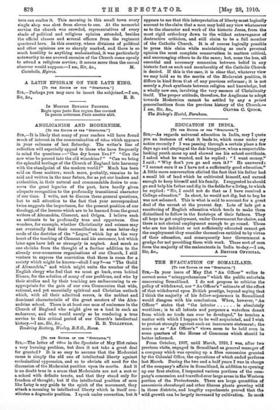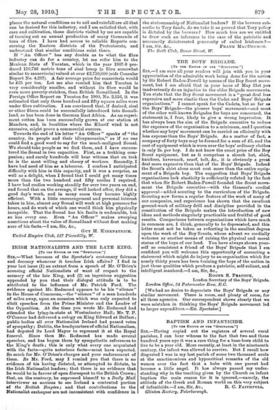THE E PACUATION OF SOMALILAND. [To m EDITOR OF TER
"SPECTATOR."] your issue of May 21st " An Officer" writes to correct some " misapprehensions " which the public entertain concerning Somaliland. I do not propose to criticise the policy of withdrawal, nor " An Officer's " estimate of the effect of that withdrawal upon British prestige, beyond saying that I think the majority of his fellow-sojourners in Somaliland would disagree with his conclusions. When, however, "An Officer" states that "the interior is absolutely worthless ; is to all intents and purposes a waterless desert from which no trade can ever be developed," he touches a matter with which I happen to be well acquainted, and I wish to protest strongly against such an inaccurate statement ; the more so as "An Officer's" views seem to be held even in some quarters of the House of Commons which should be better informed.
From October, 1907, until March, 1910, I was, after two previous visits, engaged in Somaliland as general manager of a company which was opening up a fibre concession granted by the Colonial Office, the operations of which ended perforce last March. During the two and a half years I was in charge of the company's affairs in Somaliland, in addition to opening up our first station, I inspected various portions of the corn. pany's concession and travelled over large areas in the Western portion of the Protectorate. There are large quantities of sansevieria ehrenbergii and other fibrous plants growing wild in those districts, and lengthy experiments proved that the wild growth can be largely increased by cultivation. In most
places the natural conditions as to soil and rainfall are all that can be desired for this industry, and I am satisfied that, with care and cultivation, those districts visited by me are capable of turning out an annual production of many thousands of tons of fibre. I have had access to reliable Reports con- cerning the Eastern districts of the Protectorate, and understand that similar conditions exist there.
If " An Officer " has any doubts as to what the fibre industry can do for a country, let me refer him to the Mexican State of Yucatan, which in the year 1907-8 pro- duced 110,746 metric tons of sisal hemp (a fibre somewhat similar to sansevieria) valued at over £2,750,000 (vide Consular Report No. 4,2E37). A fair average price for sansevieria would be £25 per ton. Let me also remind him that Yucatan is very considerably smaller, and without its fibre would be even more poverty-stricken, than British Somaliland. In the Foreign Office Report on Yucatan for 1900, No. 2,556, it was estimated that only three hundred and fifty square miles were under fibre cultivation. I am convinced that, if desired, sisal or other fibres could be successfully introduced into Somali- land, as has been done in German East Africa. As an experi- ment cotton has Leen successfully grown at our station at Mandera, and, in localities where the Kharif wind is not excessive, might prove a commercial success.
Towards the end of his letter " An Officer " speaks of " the country, its people and their idiosyncrasies," as if no one could find a good word to say for the much-maligned Somal. We should take people as we find them, and I have encoun- tered the Somal in two capacities. First, as a trekking com- panion; and surely hundreds will bear witness that on trek he is the most willing and cheery of workers. Secondly, I have had need of him as a labourer. I confess I anticipated difficulty with him in this capacity, and it was a surprise, as well as a delight, when I found that I could get many times more than the two hundred and fifty coolies I required. I have had coolies working steadily for over two years on end, and found that on the average, if well looked after, they did a good day's work, and in many cases they became highly efficient. With a little encouragement and personal interest taken in him, almost any Somal will work at high pressure for hours, and do work of which one would think him physically incapable. That the Somal has his faults is undeniable, but so has every one. Even "An Officer" makes sweeping assertions about the value of Somaliland without first making sure of his facts.—I am, Sir, &c.,
GUY K. KIRKPATRICK.
United Empire Club, 117 Piccadilly, W.















































 Previous page
Previous page